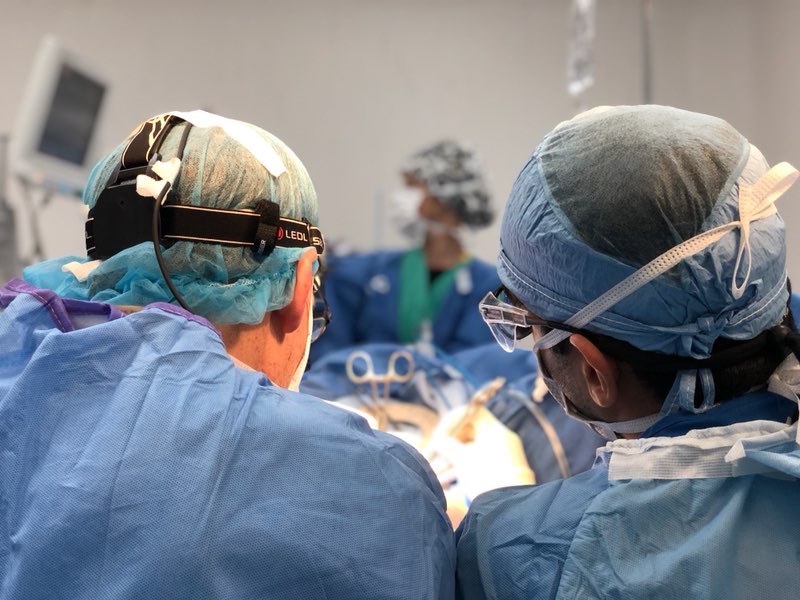For the last eight years, the team at Global Surgical Expedition (GSE) has taken teams of medical volunteers to Belize and Rwanda to enhance healthcare structures and provide life-altering surgeries, while simultaneously training and instilling a passion for global healthcare to the next wave of medical professionals stateside.
David Rapp completed his first medical mission trip to Honduras in 2000, but it was a trip to Belize that would serve as the catalyst to founding Global Surgical Expedition with his colleagues, Dr. Tim Bradford and Dr. Quinn Lippmann, partners at Virginia Urology Center, and his wife, Courtney Rapp, BSN.
With a shared medical expertise and a passion for serving and helping others, the team formulated its mission to provide international care, while preparing the next wave of surgeons to serve abroad.
Education stateside
To prepare for an international medical trip, Rapp and his team at GSE partner with medical residents to work through the logistics – from planning the trip and navigating international bureaucracies to setting up the infrastructure and performing the surgeries on the ground.
“We have the unique goal where we really wanted to focus on fostering the next generation of medical volunteers, the people who would lead the charge down the road,” said Rapp. “Lots of charities do surgical trips and take students with them, but we really wanted to create a system where we take people, educate them and give them the necessary skills to start their own organizations or to be leaders internationally.”
The need in Belize
According to the Pan American Health Organization, the leading cause of morbidity in Belize stem from complications of pregnancy, childbirth and the post-partum period – complications that are a core focus for GSE.
From incontinence and prolapse to kidney and bladder cancer, to obstructions and fistulas, GSE builds up the infrastructure that allows the local surgeons to complete these otherwise routine procedures that aren’t possible with their existing set-up.
“There are lots of procedures that require equipment that’s quite expensive, like retractor systems, ultrasound machines, laparoscopic cameras,” said Rapp. “We try to build up the physical equipment infrastructure, then teach to the degree we can the local urologists and gynecologists to use what’s available to them.”
Equipping the community in Rwanda
While the focus of the Belize trips lean more heavily on the American medical residents, Dr. Quinn Lippmann is focused on training the Rwandan doctors on the ground to empower them with the skills needed to better serve their community in the long run.
“Rwanda was pretty devasted by its civil war, which essentially wiped out a lot of the physicians. The whole hospital system was pretty devasted,” said Lippmann. “They’ve been slowly rebuilding. The residents I’ve worked with are now graduating, and we’re working on educating the next group as they’ve reassembled their medical system.”
On her mission trips, Lippmann goes into teacher mode, giving lots of lectures and running workshops on doing simple procedures – like fixing tears after delivering a baby. Her goal is to empower the attendings in Rwanda to feel comfortable doing these procedures on their own.
Coming out stronger on the other side of a pandemic
Because of the COVID-19 pandemic, international travel and the primary service provided by GSE has been put on hold, but that doesn’t mean the team stopped working. They’ve spent 2020 researching, applying for grants, pivoting messaging and marketing – so that when they are able to resume travel, they’ll start off strong.
“There is a lot of suffering right now, and we’re preparing for the minute the pandemic is tempered and access to these countries opens back up,” said Rapp. “It’s a struggle to hear about the suffering and not being able to intervene, but we’re focusing on the medical residents here in America and giving them the best education we can for when it’s time to go.”
Additionally, GSE has taken a look inward at how it educates people outside the medical community about what it does and what its needs are. Some of the ways the organization is doing this is through an expansion of its board to include more than just representatives from the medical community.
“We’re mostly doctors here. We would really benefit from other expertise and other vantage points that other big organizations have,” said Rapp. “We want to reach people to help, whether its donations or expertise. We’re an organization that fosters that, we believe that people can get involved and really make an impact and be part of this in a direct, impactful way.”
If you’re looking to get involved with Global Surgical Expedition, whether it’s through medical service, board involvement or by simply giving a donation, visit its website, Facebook or YouTube pages.











Great cause! Thanks for the write up.